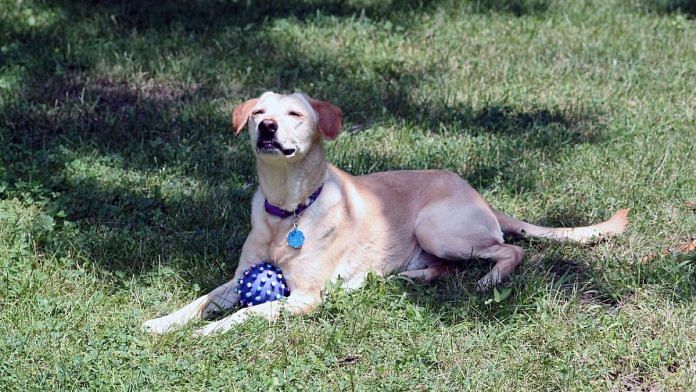Kannada movie (2022), which follows the journey of a lonely factory worker and his Labrador, stayed with me long after it was over. It wasn’t a perfect film, but it was sincere, and it made me decide that it was time to get a dog of my own.
Hachi had been abandoned and had spent some time on the streets until he was put in a cage shelter. I named him after the loyal Japanese dog who waited forever for his owner at the same spot. Hachi mesmerised me with his soulful eyes and the lion-hearted way he carried his weather-beaten body. He was riddled with scars, had signs of hip dysplasia, and had the quiet patience of someone used to waiting. I didn’t know it then, but I was the one being rescued.
I was clear from the start that I wouldn’t buy affection. While those uneasy around big dogs generally buy small-sized ‘toy’ breeds, I wanted a regular-sized dog. And unlike most, I wasn’t keen on a particular breed either. If more people adopted dogs instead of buying fancy breeds from dubious sources, we would have fewer dogs suffering in shelters.
Hachi always had a playful glint in his eyes. The moment the cage opened, he jumped at me and scratched my arm. And everything I thought I knew about animals, about myself, and about the very essence of love, shattered and reformed.
Hachi was a whirlwind of anxieties when he first arrived. Rescued from unforgiving streets, he carried the scars of survival: a wary glance, a flinch at sudden movements, and a deep-seated fear of enclosed spaces. He was a living example of the harsh realities faced by India’s street dogs. These resilient creatures navigate a world teeming with traffic, hunger, and, all too often, human cruelty. They live on the fringes, their lives a precarious balance between scavenging for scraps and dodging dangers.
Bringing Hachi home was less an adoption and more a reluctant truce. I, the lifelong dog hater, found myself navigating a world of puppy pads, chew toys, and the bewildering language of barks and whines. The initial weeks were a test of patience, a battle against ingrained biases. But then, a subtle yet profound shift occurred.
It’s almost magical how dogs know what you’re going through. Hachi walks into my room, sits beside me and just looks at the wall. How does he know that caressing him will make me happy? He stares into my eyes and says a lot without speaking anything. It’s like he’s saying: “I know what you’re going through, and I’m here for you”. He’s like an anti-depression pill in furry form. And that look he gives me when I’m leaving him alone at home– it always breaks something inside me. I have a camera installed in my living room, and every time I step out, I check on him. He’s always plonked next to the door, waiting for me. Dogs truly spend most of their time waiting for us.
When he runs to me upon my return from work, all the tension of a supposed bad day goes away. Hachi can’t read time, but he waits for me exactly outside my room when it is time for his walk, and barks in desperation if his food is late by even five minutes. It’s like his biological rhythm is the same as mine. Hachi is always there, tail wagging a frantic rhythm, eyes shining with an almost unbearable joy at my mere presence. It is a love so pure, so uncomplicated, that it has bypassed all my cynicism.
He doesn’t care about my bank balance or my bad hair days. He simply loves. This wasn’t the unconditional affection I was accustomed to in human relationships, which are often riddled with expectations and unspoken demands. This was absolute, unwavering devotion. Hachi never demanded affection. He simply stayed. Beside me when I worked. A few steps behind me during evening walks. Curled at my feet during monsoon power outages. Asking for nothing but giving everything.
Hachi is naughty and gets irritated when there’s noise outside. Many times, I shout at him because he won’t stop barking. He gets traumatised by noise, and I get irritated by his noisier response. He often tugs at his leash and makes me go around in circles. But I give in each time. After all, he only gets 30 minutes a day to see and smell the world. I cannot forget how euphoric he was on his first visit to the beach, so happy that he refused to come out of the water. One day, I will take him to see the snow and even the desert, so that he knows that the world is bigger than our apartment.
Dogs have this mysterious ability to make you more human. They hold up a mirror to your better self – the version of you that’s patient, present, and open-hearted. With Hachi, I began noticing things I never had the time or tenderness to appreciate before: the gentle rhythm of his breathing as he rested on my lap, the sheer joy on his face during windy auto rides, and the trust in his gaze whenever our eyes met. It softened something in me. And from that softness bloomed empathy not just for him, but for people.
If dogs have one flaw, it’s that they don’t live long enough. It’s a truth every dog parent faces, a poignant reminder of impermanence. Years pass in a blur of belly rubs, fetch games, and countless moments we didn’t know we’d cherish until later.
Each day with my dog feels like a precious gift. It forces me to appreciate the present, to cherish every sloppy kiss, every tail wag, every quiet moment of companionship. I know he will be the first in our family to die. But I have to be practical and learn to make peace with it. Getting a dog is setting yourself up for eventual heartbreak. All I can do is make his time with me special. I’m only human, so I may not be perfect every day, but I try to be for Hachi. He has hip issues like most Labradors, so I have already saved up for a customised wheelchair for when he gets older and can no longer jump at people.
My journey from dog hater to devoted dog parent has been nothing short of a revelation. Hachi didn’t just change my life; he expanded it. He taught me about a love so pure that it transcends words, about empathy that requires no language, and about gratitude for life’s simple joys. He showed me that sometimes, the greatest lessons come on four paws, with a wagging tail and a heart full of devotion. In doing so, he helped me find a piece of my own humanity I didn’t even know was missing.
Not everyone is born a dog lover. Some of us need a little nudge – a quiet presence on a rainy evening, a pair of steady eyes that see through the walls we’ve built. But once you let them in, dogs have a way of rewriting your soul. They remind you that you are capable of deep tenderness. That empathy is not a trait you’re born with, but a muscle you can build if you’re willing to learn.
(Edited by Zoya Bhatti)








